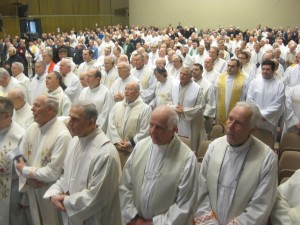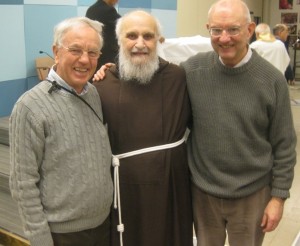I went on a retreat/conference last week, and if a retreat does anything that is meaningful it should help us to grow in our love for Jesus in myself and among us. This is what happened. It was simple and normal and a lived experience of the presence of Jesus for the Diocesan Priests and Religious who came, I suppose about 700 in all. There is a photo below that shows a part of the priests and religious at the mass we had together.
During the course of it all we had a talk about the Vatican Council. The speaker, a respected Theologian and Rector of a University, spoke about there being one Council of the Church that could be compared with Vatican 2.
As he said this I racked my brains to think which Council that could be? I thought of the Council of Trent, in the mid 16th Century. The nineteenth ecumenical council opened at Trent on 13 December, 1545, and closed there on 4 December, 1563. Its main object was the definitive determination of the doctrines of the Church in answer to the heresies of the Protestants; a further object was the execution of a thorough reform of the inner life of the Church by removing the numerous abuses that had developed in it.
But that was not the reason why “good” Pope John 23 called the second Vatican Council – 11 October 1962 till 8 December 1965. In fact there was no specific reason. Pope John 23 had said it was “to bring the presentation of the Church’s doctrine up to date and to promote the unity of Christians”. These two objectives were intended to renew the Church’s relation with the modern world and thus to revive her mission to the whole world.
Nearly all the Ecumenical Councils of the Church were summoned for particular theological reasons, not for “general renewal and to promote unity” even if these would be a welcome outcome always.
The speaker at my retreat finally revealed what he meant. He said “the council that is like the 2nd Vatican Council is the very first Council of the Church, the Council of Jerusalem”.
That council was set up to identify the right direction for the newly born Church in regard to the major differences of approach between the newly converted Christians. At the beginning of the Church a strong group came from the Jewish community, and another bigger group from “pagans or non Jews”. The Jerusalem Council happened about the year 48AD. They needed to discern the right way .to be disciples of Jesus Should they follow Jesus and also many Jewish rituals that Jesus probably had himself followed? Or should they follow Jesus and leave behind the Jewish rituals that were alien to the non Jewish converts? It was St. Paul who wrote on this issue: “I regard everything as loss because of the surpassing value of knowing Jesus Christ my Lord. For his sake I have suffered the loss of all things, and I regard them as rubbish in order that I may gain Christ” (Phil 3:8). The words “everything” and “all things” refers precisely to the Jewish practices binding through the Old Testament Law and its interpretations for Jews. The Jerusalem Council came down firmly on following the way that that no longer emphasised the Jewish rituals. Rather to follow St. Paul who goes on in Philippians 3, verse 11: “I want to know Christ and the power of his resurrection and the sharing of his sufferings by becoming like him in his death, if somehow I may attain the resurrection of the dead”. It was a new beginning sanctioned by the authority in the Church
The first disciples had a strong personal relationship with the risen Lord who had been crucified within the living body of Christ, the Church. So should we. His Holy Spirit would teach them how to live, how to act, what rules to follow and what ways to worship and so on. The Holy Spirit will teach us also. Yes, there was authority in the Church from the Apostles and their successors and it was an authority of service for the whole body. That authority still exists in the Church.
The right direction for the Church today and each individual in it is exactly what needs to be discovered and the second Vatican Council has given us authoritative guide-lines. In this sense it is a new beginning although it takes away nothing from the tradition of the Church in the past. Our challenges lie in the fact that we do need new ways to express these age-old truths in that sacred and long tradition today.
The expression is not necessarily in words so much as in a living experience of the risen Jesus within his body the Church, who by the power of the Holy Spirit leads us to the Father. Words to explain this real presence of Jesus in each of us and among us will only come later.
Jesus himself spoke about “those who gather in my name will find me among them” (Mt 18: 20). Gathering may or may not be in Church, may or may not include speaking of the Gospel, but He is still there.
So I recommend each reader to find some friends who take living for God as the gospel teaches as a high priority and live it out. That is why I went on my retreat. If a person is lucky he or she will find these companions, and all of us are entitled to, and all of us need such help and guidance today. Furthermore it is an adventure of Love, for the message of the Gospel is indeed one of Love, a message that leads to our fulfilment as human beings as well.
Fr. Dermot Mills OMI, Fr. Bonaventura Marinelli, OFM Cap and self OSB last week


